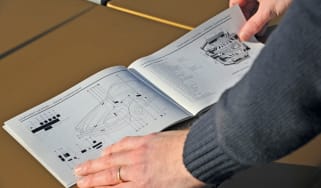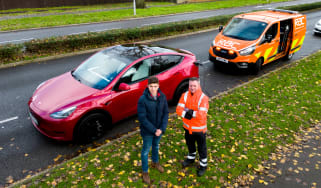What is an HPI check?
Many adverts will mention that a car is “HPI clear”, but what is an HPI check and should you get one on the car you're buying?

If you’ve been looking to buy a used car, you may have come across the terms ‘HPI’ or ‘HPI Clear’ on car adverts, but what does this mean and what exactly is an HPI check?
When buying a used car, it is relatively straightforward to check for physical problems such as rust, dents or scratches. However, it's nearly impossible to understand a car’s history from a physical inspection alone. It could have been involved in a serious accident and written-off, have outstanding finance, clocked mileage or other hidden issues.
This is where an HPI vehicle history check comes into play. An HPI check provides essential information about a car’s history, which is especially useful for potential buyers before they commit to a purchase. A full HPI check isn’t free of charge, but the small extra cost is certainly worth it for the added peace of mind, and it could help to prevent any costly repercussions further down the line.
The service is called an HPI check because the company HPI (Hire Purchase Investigation) was one of the first to provide vehicle checks for car buyers. Today, there are a variety of different companies providing vehicle history checks, but the HPI check is the best known and often used as a catch-all term to refer to all vehicle history checks in general.
With over 80 points of information gathered on the car, the HPI check is certainly very comprehensive and our independent tests couldn't really fault the service. However, it isn't the cheapest option on the market and alternatives from TotalCarCheck and VCheck offered better value for money. Be very wary of online services offering free car history checks because we've yet to see a worthwhile car check service that didn't charge a fee. You get what you pay for.
What does an HPI check show?
Depending on the level of HPI check you purchase, the information could include:
- Outstanding finance and/or logbook loans – have all the debts against the car or debts in which the vehicle was used as security been paid off? If not, it still belongs to a finance company.
- Write-offs – has the car previously been classed as an A, B, C, D write-off, or the newer S or N write-off categories by an insurer?
- Theft – has the car been recorded as stolen on the Police National Computer?
- Mileage – HPI’s mileage register holds 200+ million speedometer readings.
- Previous owners – HPI can tell you how many previous owners a car has had, courtesy of the DVLA database.
- Number plate changes – again harvested from the DVLA records. Many cars have a cherished registration, but it is good to check these are all in order and not being used to disguise a past.
- VIN/Chassis numbers – allows you to check recorded engine and chassis numbers against those on the car itself.
- Scrapped vehicles – as with Cat A and B insurance write-offs, you don’t want a car that shouldn’t even be on the road.
- Imported/exported vehicles – cars built for foreign markets can be harder to insure or repair, while cars registered as exported shouldn’t be for sale here at all.
- MoT status – is that MoT certificate you’ve been shown genuine?
- Road tax/Fuel costs – useful for cars that use the older emissions-based road tax system, plus you’ll get an estimated cost of fuel over 12,000 miles.
If a car is listed as ‘HPI clear’, that means that it has had an HPI check which showed no problematic data. A used car that is HPI clear should have no officially documented issues with its history.
What doesn’t the HPI Check tell you?
While the check will confirm how many previous owners a car has had, it won’t tell you who those owners were – so in that sense, it won’t help you research extra details of the car’s history.
The HPI check doesn’t provide details of any previous accidents which haven’t written the car off or its service history. So unless you are buying a vehicle that has been given a Category A, B, C, D, S or N write-off classification by an insurer, you’ll need to rely on a seller – or your visual inspection – to tell you that. The HPI check also does not record the car’s service history, which can usually be found within the owner’s handbook.
Also, bear in mind that a stolen car could have been disguised to hide its identity. It's worth checking the chassis number (from a number of locations – you can look online to see where to find them for a particular model) as well as the registration.
How much is an HPI check?
An HPI check can cost anywhere from £1.99 to more than £20, depending on the service provider and the level of assessment you choose. It’s worth paying for the highest level of HPI check that you can afford. If you end up buying a car that still has finance outstanding, the finance company (which technically owns the car while the finance is being repaid) can repossess the vehicle, irrespective of the fact that you've bought it.
That means you'll be out of pocket and without your new car, and there's not much you can do about it. If you're paying £10k for a used car, then an extra £20 just to double-check a car's status is worth paying for that peace of mind.
Finance companies aren’t the only ones who might come and take your car away. HPI added stolen car information to its search just after World War II, so a check should ensure that the police won’t come and repossess your car either.
HPI extended its reach in the 1980s by adding crash history data supplied by insurance companies. Checking for an insurance write-off is essential, as cars with damage are worth less and may have been poorly repaired. Using the identity of a write-off is also a common way to disguise a stolen car.
These days, with so much information stored online, HPI claims that its check accesses 80 different data points to help make sure a car comes with no hidden surprises. When you pay for a vehicle history report, it will provide information in the following areas:
Is an HPI check worth it?
With all this information at your fingertips, and because it’s provided at a relatively low price, it really is worth paying for a car history check – especially if you're handing over a significant amount of cash for your purchase. If you’re buying from a used car dealer, you can reasonably demand they provide a free HPI check for you - and some companies even use the HPI check facility to encourage buyers through the door.
There are cheaper alternatives to HPI checks, allowing you to tailor the check to what you need. For example, there is unlikely to be outstanding finance on an older vehicle, but an HPI check would let you know if the car had been involved in a serious accident. We've found that while the HPI Check is still the gold standard, other services can give you better value for money.
Some checks, such as the mileage status and MoT history, can even done yourself for free online but avoid actual car check services that claim to be free.
It is always worth bearing in mind that HPI checks can’t guarantee that a car will be free from issues. Some cars may have been written off, repaired and listed for sale to unsuspecting buyers, with HPI checks failing to show any indication that these cars have been in a significant accident. You still need to use your judgement before taking the plunge.
Next, check our guide on the Best car check websites 2022 and how to Sell my car








